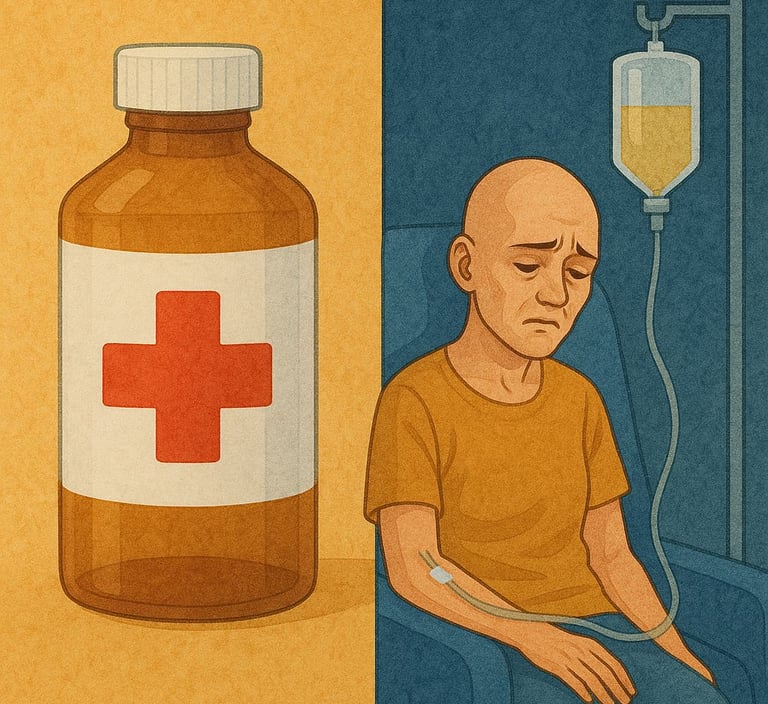Strategizing from 7 cities across the globe
Chemotherapy: A Medical Advancement or a Moral Setback?
elie jesus hobeika, thalia hassoun


I-Introduction: Rethinking Chemotherapy for the Elderly
Resting in a hospital room thick with the odor of antiseptics, the dripping of liquid from IV bags, and the beeping of machines echoing through every corner of the hall, the elderly patient finally broke their silence . “Doctor, is it really worth it?”, they said, squeezing the armrest firmly as their eyes flickered between the physician and their loved ones. Many senior patients go through this nerve-wracking experience, shuffling through feelings of fear and hope. As years pass by, chemotherapy remains the most significant approach to treat cancer. Despite all the hostile and dismal consequences that come with chemotherapy, scientists and doctors continue to rely on it to treat cancer patients. In most cases, chemotherapy is the only option to be used, as other treatments may be too expensive, unsafe, or unauthorized for use. While some patients are lucky enough to have received chemotherapy which proved valuable during their battle with cancer, others are less fortunate, withstanding horrible side effects and scarring experiences. Research published in the Journal of Clinical Oncology reported that about 16.7% of elderly patients undergoing first-line chemotherapy suffered functional decline, evidenced by a reduction in Activities of Daily Living (ADL) scores within treatment cycles (Hoppe et al., 2013). Undergoing chemotherapy is a multifaceted decision, where concerns arise from several origins such as ethical dilemmas, emotional struggles, mental health challenges, financial burdens, and policy considerations. Aiming to find a more patient centered approach, this paper will tackle the aforementioned concerns and showcase the hidden connections to chemotherapy.
II. Understanding Chemotherapy: How It Works
Chemotherapy is a treatment used to target cancerous cells in the body by damaging cancer cell DNA, inhibiting mitosis, and disrupting cellular metabolism (NCI Drug Dictionary, n.d.). Although chemotherapy is a strong tool to shrink tumors and slow down the progression of cancer, it is not a precise treatment. Instead of solely targeting cancerous cells, it can also affect normal, fast-growing cells including bone marrow cells, gastrointestinal lining cells, and hair follicle cells. As a result, the supposedly effective chemotherapy treatment could result in several unpleasant complications such as immune suppression, nausea, and hair loss ([Subpopulations of Peripheral Blood Dendritic Cells During Chemotherapy of Ovarian Cancer], 2007). Elderly patients undergoing chemotherapy tend to experience these adverse effects more severely because they often already have reduced kidney and liver function. These reduced capacities impact drug metabolism and clearance, making them even more vulnerable to toxicity (American Cancer Society, 2019). Furthermore, they increase the risk of severe side effects such as infections, anemia, and organ dysfunction, complicating the decision to proceed with chemotherapy. Many oncologists now advocate for a patient-specific approach, evaluating physiological age rather than chronological age to determine treatment eligibility (Williams et al., n.d.).
III. Efficacy and Probability of Success in the Elderly
The results from chemotherapy in older patients tend to differ due to factors including the patient’s age, stage of treatment, and individual health condition. Research shows that patients with advanced-stage non-small cell lung cancer (NSCLC) derive a median survival advantage of approximately 33 days along with a 9 percent improvement in one-year survival after undergoing chemotherapy (Earle et al., 2001). Despite these negligible benefits, patients often experience extreme side effects, leading many to opt for less aggressive treatment options.
One of the most counterproductive approaches is the frailty dilemma. Compared to younger patients, older adults are prone to greater chronic conditions that complicate the effectiveness of chemotherapy. The fragile state of the patient’s immune system, as well as underlying heart disease, can result in the patient becoming hospitalized post-treatment, rendering them dependent and severely reducing their overall quality of life (American Cancer Society, 2019). This poses the dilemma: is it necessary to deliver chemotherapy if the potential advantages are so trivial?
IV. Beyond Science: Ethical and Emotional Considerations
Determining when to initiate chemotherapy for elderly patients is not solely a medical issue; it is an ethically challenging one as well. Professionals grapple with extending a patient's life while also considering their dignity and quality of life (DuMontier et al., 2021). The ethical elements include patient autonomy, where capable adults are free to make a decision as long as the consequences are clear and there is no coercion involved. A number of patients may feel obligated to proceed with chemotherapy to satisfy familial needs even when their true desire is to die with dignity (Ghose et al., 2019). Patients may be choosing certain courses of action to please other individuals, like relatives for example, which would mean that their autonomy is being undermined, even if there is no overt coercive behavior. Emotional coercion, while lacking the overt force of physical or legal pressure, can be extremely potent, guiding patients to submit to treatments that they do not, deep down, wish to undergo. It is vital to understand and respond to these pressures to make sure that the decisions made at the end of life are genuinely representative of the values and desires of the patient and not merely those of the people situated around the patient.
The psychological consequences are just as debilitating, as many elderly cancer patients are deeply anxious and depressed. This is worsened by the physiological effects of chemotherapy, as the loss of autonomy, long hospitalization, and the prognosis of death are profound sources of stress (Tartaglia, 2025). Research indicates that older patients with depression tend to suffer from the effects of severe chemotherapy treatment more than their mentally stable counterparts (Jayani et al., 2024).
V. Mental Health Implications of Chemotherapy in the Elderly
Besides the impacts on one’s physical wellbeing, chemotherapy profoundly affects one’s cognitive and psychological health. “Chemo brain” is a common phenomenon that refers to memory issues, concentration problems, and a general reduction of mental faculties that elderly patients undergoing chemotherapy tend to complain about (“Cognition and Cancer Treatment,” 2020). Mental faculties denote a person’s cognitive skills: thinking, reasoning, remembering, and processing information. Patients may have difficulty with tasks, decisions, or conversations when these faculties are affected by chemotherapy. This decline leads to frustration and reduced autonomy, a troubling sense of self, and, more acutely for older patients, an exacerbation of age-related cognitive decline. Although these symptoms are mostly reversible, they may complicate existing cognitive dysfunctions and increase reliance on caregivers (Informal Caregivers in Cancer (PDQ®), 2025).
Apart from losing mental faculties, chemotherapy patients are also likely to experience profound feelings of anxiety and depression. Chronic cancer treatment, combined with social alienation and physical weakness, can greatly affect one’s self-esteem and sense of identity (Emotions and Cancer, 2025). Research suggests that elderly cancer patients experience more depressive episodes than their younger counterparts owing to worries about diminished control over their life and growing concern of death (Borza et al., n.d.).
VI. Potential Alternatives to Chemotherapy
Following the unfavorable side effects of chemotherapy, other approaches were developed by physicians and scientists. One of the newer approaches, called targeted therapy, seeks to minimize collateral damage by intentionally destroying cancer cells (Targeted Therapy for Cancer, 2022). Another novel approach, named immunotherapy, has effectively been used to treat melanoma and lung cancer (World Health Organization: WHO, 2025).
One of the novel therapies introduced is hormonal therapy. This was used alongside other therapies since it can be applied to some hormone-dependent cancers such as breast and prostate cancer. This therapy works by changing the levels of hormones to control the growth of cancerous tissue and usually inflicts less damage than the more forceful interventions such as chemotherapy (Hormone Therapy for Prostate Cancer, n.d.-b). Unlike palliative care, which primarily relieves debilitating symptoms, receiving care that does not actively seek to remedy the illness helps those who do not wish to prolong suffering. This treatment is gaining prominence among elderly patients who wish to opt out of enduring a life they feel is filled with suffering (World Health Organization: WHO, 2020).
VII. Economic and Policy Considerations
The financial burden brought by chemotherapy treatment is devastating for older patients who live on a fixed income. The expenses do not only include medication, as supportive care, hospitalization, and doctor’s appointments incur additional costs (World Health Organization: WHO, 2025). Supportive care complicates the issue even further as many elderly patients struggle to afford the care required to treat them and, in some cases, treatment is skipped entirely due to overwhelming out-of-pocket costs.
Lack of proper policies continues to hinder access to cancer care for older patients. While certain oncological treatment procedures may be reimbursed by public or government-sponsored health care programs like Medicare or similar systems existing in other countries (Understanding Cancer Care Delivery Through The Medicare Advantage Program n.d.), more sophisticated treatments such as targeted therapy or immunotherapy are, more often than not, not reimbursed at all. This places older patients in a virtually inequitable situation where access to care that could, in a non-trivial way, prolong their life is based on their financial resources instead of on medical justification. Should life-extending procedures be deemed as rationed, only available to those who possess the means to pay for them? Such inequalities place burdens on policymakers who are required to expand coverage under current health plans, subsidize research towards low-cost treatment options, and design protocols aimed at determining which elderly patients would benefit the most from chemotherapy.
VIII. Conclusion
The provisions of chemotherapy in older adults should be well discussed before being acted upon. There are concerns regarding the application of chemotherapy and its effectiveness toward older adults, especially considering older patients and their emotional, mental, economic, and policy-related burdens. Applying a singular strategy to manage cancer in elderly patients lacks nuance and intricacy. It is critical to develop methods that would allow a more centered paradigm shift that fosters increased focus on life rather than mortality, especially for patients enduring the cancer battle.
Policies targeting the elderly must be broadened. Alternative medicine marketing needs to be demystified. Insurance must be restructured in a way that eliminates barriers set to tailored treatment methodologies. Protecting the older demographic from the adverse effects of standard cancer treatments requires more research. The treatment of elderly cancer patients can only be optimized by factoring in multiple scenarios and managing them through relevant multidisciplinary lenses.


Download the full document
References
American Cancer Society. (2019). Cancer Facts & Figures. https://www.cancer.org/content/dam/cancer-org/research/cancer-facts-and-statistics/annual-cancer-facts-and-figures/2019/cancer-facts-and-figures-2019.pdf
Borza, T., Harneshaug, M., Kirkhus, L., Benth, J. Š., Selbæk, G., Bergh, S., & Slaaen, M. (n.d.). The course of depressive symptoms and mortality in older patients with cancer. Aging & Mental Health, 26(6), 1153–1160. https://doi.org/10.1080/13607863.2021.1932739
Cognition and cancer treatment. (2020). American Psychological Association, Vol. 51, No. 2, 42. https://www.apa.org/monitor/2020/03/cognition-cancer
DuMontier, C., Loh, K. P., Soto-Perez-De-Celis, E., & Dale, W. (2021). Decision making in older adults with cancer. Journal of Clinical Oncology, 39(19), 2164–2174. https://doi.org/10.1200/jco.21.00165
Earle, C. C., Tsai, J. S., Gelber, R. D., Weinstein, M. C., Neumann, P. J., & Weeks, J. C. (2001). Effectiveness of chemotherapy for advanced lung cancer in the elderly: Instrumental variable and propensity analysis. Journal of Clinical Oncology, 19(4), 1064–1070. https://doi.org/10.1200/jco.2001.19.4.1064
Emotions and cancer. (2025, April 9). Cancer.gov. https://www.cancer.gov/about-cancer/coping/feelings
Ghose, S., Radhakrishnan, V., & Bhattacharya, S. (2019). Ethics of cancer care: beyond biology and medicine. Ecancermedicalscience, 13. https://doi.org/10.3332/ecancer.2019.911
Hoppe, S., Rainfray, M., Fonck, M., Hoppenreys, L., Blanc, J., Ceccaldi, J., Mertens, C., Blanc-Bisson, C., Imbert, Y., Cany, L., Vogt, L., Dauba, J., Houédé, N., Bellera, C. A., Floquet, A., Fabry, M., Ravaud, A., Chakiba, C., Mathoulin-Pélissier, S., & Soubeyran, P. (2013). Functional decline in older patients with cancer receiving First-Line chemotherapy. Journal of Clinical Oncology, 31(31), 3877–3882. https://doi.org/10.1200/jco.2012.47.7430
Hormone therapy for prostate cancer. (n.d.-a). American Cancer Society. https://www.cancer.org/cancer/prostate-cancer/treating/hormone-therapy.html
Informal Caregivers in Cancer (PDQ®). (2025, May 6). Cancer.gov. https://www.cancer.gov/about-cancer/coping/family-friends/family-caregivers-hp-pdq
Jayani, R. V., Hamparsumian, A., Sun, C., Li, D., Chien, L. C., Moreno, J., Katheria, V., Hughes, S. F. D. S., Taylor, W. D., & Dale, W. (2024). The relationship of mental health symptoms to chemotherapy toxicity risk in older adults with cancer: Results from the geriatric assessment–driven intervention study. Cancer, 130(22), 3894–3901. https://doi.org/10.1002/cncr.35482
NCI Drug Dictionary. (n.d.). Cancer.gov. https://www.cancer.gov/publications/dictionaries/cancer-drug
[Subpopulations of peripheral blood dendritic cells during chemotherapy of ovarian cancer]. (2007, October 1). PubMed. https://pubmed.ncbi.nlm.nih.gov/18200966/
Targeted therapy for cancer. (2022, May 31). Cancer.gov. https://www.cancer.gov/about-cancer/treatment/types/targeted-therapies
Tartaglia, N. W. N. (2025, January 10). Managing anxiety & depression in cancer patients. NFCR. https://www.nfcr.org/blog/managing-anxiety-depression-cancer-patients/
Understanding Cancer Care Delivery through the Medicare Advantage Program. (n.d.). https://healthcaredelivery.cancer.gov/media/understanding-cancer-care-delivery.html
Williams, G. R., Outlaw, D., Harvey, R. D., Lichtman, S. M., Zamboni, W. C., & Giri, S. (n.d.). Chemotherapy dosing in older adults with cancer: One size does NOT fit all. Journal of Geriatric Oncology, 14(1), 101363. https://doi.org/10.1016/j.jgo.2022.08.012
World Health Organization: WHO. (2020, August 5). Palliative care. https://www.who.int/news-room/fact-sheets/detail/palliative-care
World Health Organization: WHO. (2025, February 3). Cancer. https://www.who.int/news-room/fact-sheets/detail/cancer
